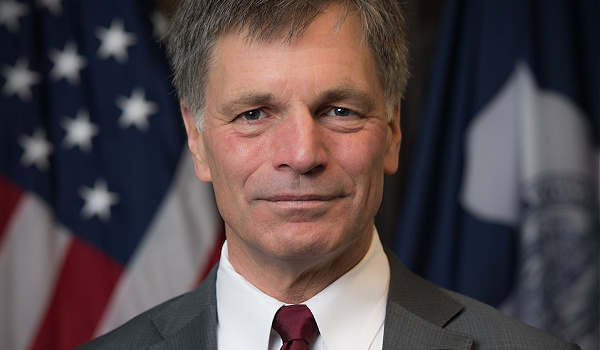Publisher’s Note: I recently had a far-ranging conversation with Governor Mark Gordon of Wyoming on the state’s innovation in the blockchain sector, a new education initiative underway there to educate their youth in digital finance, and the future of stablecoins. See our synopsis below and at the end of the article you’ll find the full video of the interview. – Cindy Taylor/Publisher
Wyoming has Become one of the Centers of the U.S. Blockchain Industry
It remains true that the center of the U.S. banking industry remains in New York, the corporate center of the country is in Delaware, the center of American agricultural and industrial finance remains in Chicago, the center of the North American technology industry is still Silicon Valley and the cultural pulse of the Western Hemisphere is still most easily felt in southern California.
So how did blockchain and crypto find their way to a boxy, beautiful state in the sparsely-populated mountain west?
While much of the answer lies in Wyoming’s business-friendly and low-tax climate, it was also the political will of leaders like Governor Mark Gordon that brought blockchain’s unique synthesis of technology and finance to the state.
“Wyoming really has been trying to help explain this technology,” said Gordon in a recent interview with Digital Wealth News. “And it’s very new, a lot of it is kind of too geeky for some folks, but others are getting much more interested in it. We know in the west that life and lifestyles are changing, and that a lot of technology is coming, a lot of new enterprises, a lot of new kinds of opportunities.”\
That’s why Gordon has helped launch the Wyoming Blockchain Initiative to help educate grade-school level students on the basic concepts of blockchain technology and cryptocurrencies.
How Did Blockchain Get To Wyoming?
But Gordon’s background is not in technology or finance—like many of his Wyomingite constituents, Gordon’s past is rooted in ranching. But even before that, he was born and educated in unlikely places for a Wyoming governor: New York City and Vermont, respectively. Don’t get us wrong—Gordon is still as Wyoming as they come (he grew up on his family’s ranch in Kaycee, Wyo.), and he’s become immensely popular in his state by navigating his own third way between his Democratic opposition and the more conservative elements of his own Republican party—his 2022 re-election effort drew 79% of the vote in the state, the biggest win in Wyoming history.
It was actually in Wyoming’s traditional incumbent industries, like mineral extraction and ranching, that Gordon was first introduced to the concepts of tokenization and recognized their promise, particularly in the realm of carbon dioxide mitigation and control. Climate change is a difficult subject in the biggest coal-producing state in the U.S., but Gordon has become an outspoken proponent of moving Wyoming in a carbon-neutral or carbon-negative direction in ways that don’t jeopardize the state’s entrenched industries.
Carbon credits and climate exchanges are one such mitigatory tool that Gordon favors. At one point, his ranch was able to sequester several thousand metric tons annually, he said, and generate profit from that using carbon credits on the Chicago Climate Exchange. Yet the process of converting sequestered carbon to credits to dollars is so inefficient that almost half of the credits earned by Gordon’s ranch ended up owned by a brokerage.
“Being able to do that with a blockchain would be much more efficient and would generate much greater opportunity,” said Gordon. “That’s one of my goals because I do believe that ranching is an important enterprise in our nation, but it’s hard to be able to buy a ranch.”
Land good for ranching has become astronomically expensive in the west, said Gordon, shutting most people out of the business—even those who, like himself, grew up on a ranch—but blockchain technology offers the promise of fractionalizing ranch ownership, allowing successive generations of ranching families to remain in the business—and to retain at least partial ownership if they choose.
Another application would be a kind of “QR code on a cow,” said Gordon, using tokenization to keep track of which cattle belong to which ranch or which partial owner of a ranch.
A Natural Place For Innovation
Now Gordon thinks Wyoming is a natural place for blockchain to flourish in a new financial and technological pioneering spirit.
“We were the first state to come up with limited liability corporations LLCs, and we’ve kind of continued on from there.” said Gordon. “I think it’s because we’re a small nimble state, our legislature works very closely with the governor, and as a result, we’ve been able to really get some groundbreaking work done.”
For example, Wyoming has set up “speedy banks,” special depository institutions that can handle crypto-related assets. The state was also one of the first to allow the creation of “distributed autonomous organizations,” or DAOs, democratic decision-making blockchain networks governed by code, not individual people or parliamentarians. Wyoming now recognizes DAOs as LLCs.
The first application of this concept in ranching is called the WagonDAO, a 150-member decentralized network that owns The Wagon Box, a Story, Wyo. retreat.
“I don’t know how successful they have been, but the idea is to tokenize the ownership of it,” said Gordon. “So they are there. Now, it is an interesting situation, because the community itself is very independent, and they don’t really have an organized government. So in some ways, a DAO fitting into that should work, but there’s also maybe some instilled traditional points of view. So we’ll have to see how that works out.”
This year, Gordon and Wyoming are embarking on the process of launching an official state stable coin, a digital token whose value is pegged to the dollar. If successful, they will be the first state to launch a virtual currency.
To that end, in May, Gordon signed into law the Wyoming Stable Token Act, creatlng a path for a government-issued digital currency in the U.S.
“Wyoming really loves to be an innovator, and certainly a Wyoming stable token is innovative,” said Gordon. “But as I also mentioned, you know, we had the speedy bank structure, we have started to try to move that as a more viable business alternative settlement alternative, and a stable token fits really well within that overall framework. We’re going about it in a very meticulous way, because as you’ve seen, with Sam Bankman-Fried and FTX and everything else, we have a climate in D.C. right now with the regulatory structure that is absolutely against the innovation that we’re going to see and blockchain and, and digital assets.”







